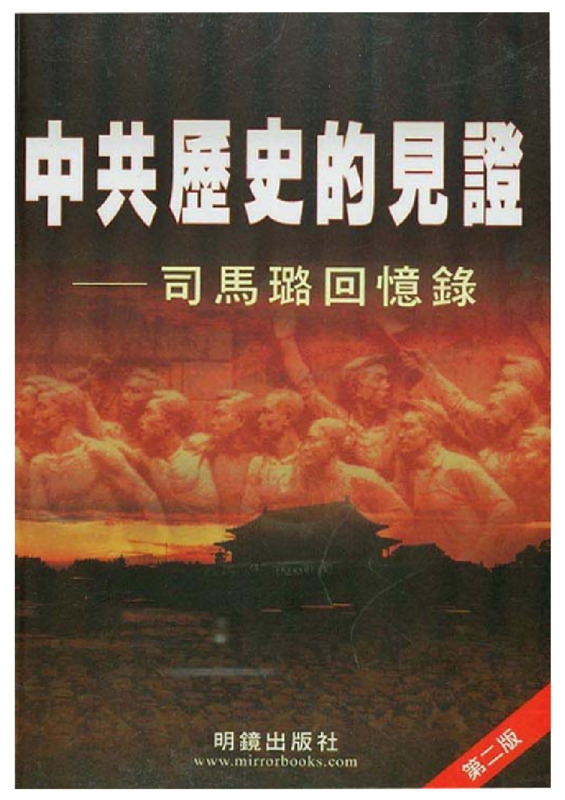Explore the collection
Showing 8 items in the collection
8 items
Book
At the Crossroads of History
This book is Gao Hua's next masterpiece after *How the Red Sun Rose*. It entails a selection of papers published by the author between 1988 and 2004, covering the fields of Republican history, Communist Party history, and contemporary Chinese history. It captures the historical interaction between the present and the past. Gao reflects deeply on the far-reaching Chinese Communist Revolution. With a rigorous and empirical research methodology, he sketches a complex and colorful picture of history, presenting the multiple facets of twentieth-century China's history.
Book
Collected Papers of Wu Yisan (2)
Writer Wu Yisan is the founder of Hong Kong Five-Seven Society, an organization established in 2007 and dedicated to the collection, research and publishing of everything related to the Anti-Rightist campaign in 1957, to restore and present the truth about a period of history characterized by severe persecution of intellectuals. Over the years, Mr. Wu has devoted himself to compiling *[The Dictionary of Names of 1957 Victims](https://minjian-danganguan.org/collection/1957%E5%B9%B4%E5%8F%97%E9%9A%BE%E8%80%85%E5%A7%93%E5%90%8D%E5%A4%A7%E8%BE%9E%E5%85%B8)*. As the Chief Editor of The Hong Kong Five-Seven Society Publishing House, he also published *The Biographies of the 1957 Rightists* and *[New Biographies of the 1957 Rightists](https://minjian-danganguan.org/collection/%E2%80%9C%E4%BA%94%E4%B8%83%E2%80%9D%E5%8F%B3%E6%B4%BE%E5%88%97%E4%BC%A0%EF%BC%88%E4%B8%8A%EF%BC%89)*.
This book is a collection of Wu’s political essays, including nearly one hundred of his published and unpublished essays and speeches between 1999 and 2017, including historical and current affairs analyses, with an emphasis on commentaries of persecuted intellectuals and political dissidents. These people are often called "traitors of China (han jian)" by CCP, but Wu Yisan argues that the CCP is the real traitor that betrays the country and its people.
Our archive also hosts another anthology of his, *[Is Chen Yi a Good Comrade](https://minjian-danganguan.org/collection/%E6%AD%A6%E5%AE%9C%E4%B8%89%E6%94%BF%E8%AE%BA%E6%96%87%E9%9B%86%EF%BC%881%EF%BC%89)*?
Book
Fifty Years of the Chinese Communist Party
The author Wang Ming was an early member of the Communist Party of China (CCP) and the first of the "28 and a half Bolsheviks," who lost power after the Yan'an Rectification and were gradually marginalized by Mao. After the Yan'an Rectification, the Internationalists, led by him, lost power in the party. He was gradually ostracized by Mao Zedong, who expatriated him to the Soviet Union in 1956. In his book, Wang Ming recounts his decades-long feud with Mao. It provides a fascinating insight into the early history of the CCP.
Book
Mao: The Unknown Story
This book presents the dramatic life of Mao Zedong, revealing a wealth of unheard-of facts: why Mao joined the Communist Party, how he came to sit at the top of the Chinese Communist Party, and how he seized China step by step. Writers Jung Chang and her husband Jon Halliday took ten years to complete this book, interviewing hundreds of Mao's relatives and friends, Chinese and foreign informants and witnesses who worked and interacted with Mao as well as dignitaries from various countries.
Purchase link:https://www.amazon.com/Mao-Story-Jung-Chang/dp/0679746323.
Book
Memoirs of Sima Lu: A Witness to the History of the Chinese Communist Party, The
Sima Lu (1919-2021) was an expert on the history of the Chinese Communist Party. He joined the Chinese Communist Party in 1937, then was politically persecuted in Yan'an, left it, and was expelled from the Party in 1941. In 1952, Sima Lu published “Eighteen Years of Struggle” in Hong Kong, writing about his tortuous journey from defecting to the Communist Party to his awakening and eventual choice of freedom. It became a sensation. He has made in-depth special studies on several leading figures of the CCP, such as Qu Qubai and Zhang Guotao. His memoir, “Witness to the History of the CCP”, is divided into three chapters according to its contents: the first is about his personal experience, the second about the first generation of CCP figures, and the third is devoted to the struggle between Mao Zedong and Zhou Enlai.
Book
Newly Discovered Mao, The: Volume I
Author Wang Ruoshui spent his early years studying philosophy at Peking University. He served as deputy editor-in-chief of the Communist Party newspaper “People's Daily” and was able to participate in high-level ideological discussions, gaining a deep understanding of Mao Zedong as a person and of his thought. He was one of the rare intellectuals within the CCP system who had an independent personality as well as the ability to think for himself. After his death from cancer, his wife, Feng Yuan, helped put together this posthumous book. Published by Ming Pao Press in 2002, it has been described as "the first and most comprehensive and in-depth discussion of Mao Zedong and his thought."
Book
Newly Discovered Mao, The: Volume II
Author Wang Ruoshui spent his early years studying philosophy at Peking University. He served as deputy editor-in-chief of the Communist Party newspaper "People's Daily" and was able to participate in high-level ideological discussions, gaining a deep understanding of Mao Zedong as a person and his thought. He was one of the rare intellectuals within the CCP system who had an independent personality as well as the ability to think for himself. After his death from cancer, his wife, Feng Yuan, put together this posthumous book. Published by Ming Pao Press in 2002, it has been described as "the first and most comprehensive and in-depth discussion of Mao Zedong and his thought.
Article
Poppies under the Red Sun: The Opium Trade and the Yan'an Model
In the 1990s, history scholar Chen Yongfa made a fundamental study of the opium economy two decades before the founding of the CCP and completed a monograph, "Poppies under the Red Sun: The Opium Trade and the Yan'an Model". Since then, more and more research articles have been written on the subject, and new information has appeared. Subsequently, the phenomenon of the opium economy of the CCP's Yan'an regime has also became an important field of study.







